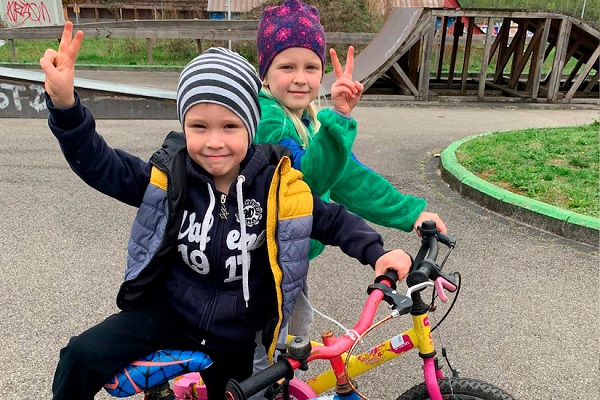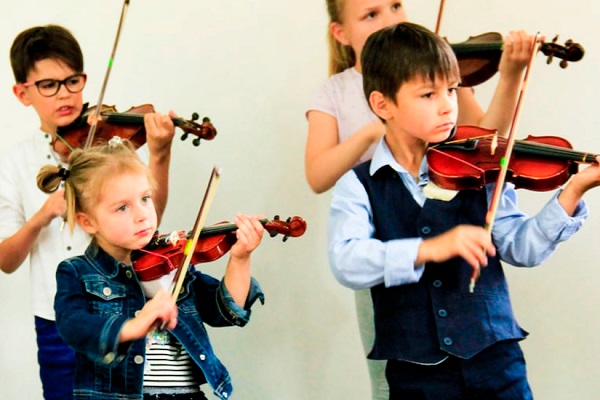 Credit: Riding the Rainbow
Credit: Riding the Rainbow
Chronicle.lu recently had the opportunity to catch up with the team behind the "Riding the Rainbow" project one year after the latter donated a first bicycle to a Ukrainian refugee family.
Last spring, Afrilanthropy asbl launched this project in response to the influx of Ukrainian refugees in Luxembourg. The idea was to provide those in need with pre-loved items such as bicycles. Afrilanthropy co-founder and President Emanuele Santi explained that the non-profit (created in 2017) had already been engaged with internally displaced persons and in projects supporting refugees in African countries and so Riding the Rainbow "became a natural extension" of this work.
Today, beneficiaries of the project include refugees from ten countries, including Ukraine, Mali, Afghanistan and Syria, "and the list is growing". The team has also evolved to include more part-time staff and volunteers. Among them is a project manager from Ukraine, Tanya Endshpill, and Lviv-based developers, who are "supported by a team of young ambassadors" in Luxembourg and across Europe.
Commenting on the impact of Riding the Rainbow on Ukrainian beneficiaries in particular, Tanya Endshpill said: "Riding the Rainbow has been a beacon of light for those who have faced adversity, providing not only material resources but also a sense of community and support." She added: "Being a part of this movement towards social integration and sustainability fills me with pride and gratitude. Seeing the joy and hope in the eyes of the Ukrainian children we serve reminds me of my own experiences as a refugee and the importance of initiatives like Riding the Rainbow in helping individuals rebuild their lives and feel a sense of belonging in a new country."
In September 2022, the team launched the Riding the Rainbow app, with the support of André Losch Fondation and Œuvre Nationale de Secours Grande-Duchesse Charlotte. "Having a digital platform has made it possible for the app to scale the efforts of a small team and even to transcend borders," explained Mr Santi. The app recently reached the milestone of 1,000 users and has facilitated nearly 600 donations. 60% of app users are donors and 40% are refugees and asylum seekers, approximately half of whom are based in Luxembourg, although the project is being "exported" to other countries (currently seven in total) over time. "It is growing, mostly through word of mouth, the active support of our global network of ambassadors, some known athletes who have joined us as goodwill advocates and sports and civil society organisations who have agreed to promote the app within [their] communities," said Mr Santi, adding that almost 40 such organisations have signed up to the project's appeal for the "right to play" and joined the campaign "back in the game".
Elaborating on the main purpose of the app, Mr Santi explained that it "provides a safe and convenient platform where the project's main goal can be realised effectively, that is: connecting people". He noted that the app allows people to "connect in a way that feels more 'natural' and familiar and donations can be made without people having to incur logistical costs or producing environmental 'costs'. People connect to people and make a donation within their vicinity and in this way, they see the impact of their donation but also can create long term engagement between parties - and we have seen it take place in some cases where children have joined local clubs, even [found] jobs thanks to the referrals of local donors. The donation has become an opportunity for social integration."
Users of the app include organisations that support refugees, such as the Luxembourg Red Cross, which has received in this way "around 60 bikes and musical instruments to be used in refugee camps", where music rooms are being set up. Mr Santi noted that this "all started from one donation of a piano from one of our donors". The team is now launching an appeal to encourage people in Luxembourg to donate their musical instruments for this purpose.
In terms of the success of the project and whether donations have remained stable over time, Mr Santi noted that the project had enjoyed "immediate success [against] the backdrop of a big solidarity spree in favour of Ukranians". However, he cited two major challenges by the time of the app launch last autumn: a general slow-down in this show of solidarity towards Ukrainian refugees and "fears and adaptations required by the technology". Nevertheless, donors appeared to enjoy directly donating to those in need rather than through third parties: "When people started discovering the joy of direct giving, they wanted to do more, and that is where the project started picking up".
In terms of the most-donated items, bicycles still "make up the lion share of donations", although the range of items users can donate has grown over the past year. For Mr Santi, "this is mostly because many people still associate our projects [with] bikes", but there is also a growing need for sports equipment and clothing, as well as musical instruments and electronics - the most recent category within the project. "High-value toys" such as board games are also welcome and there are plans in the near future to add children's books and prams - objects that are considered "high value for the newcomer but also capable of establishing an emotional 'connection' between donor and refugee".
Looking ahead, Mr Santi noted that the team's "dream is for the app to build the largest alliance in support of refugees and become a one-stop-shop for solidarity". He elaborated: "Our app will soon allow many organisations to feature their work in the map, use the app to send appeals (e.g. request for volunteers) and establish a better communication between those in need and those who can help. Although this was built as grassroots, we would love to extend our partnership to the government, local administrations and all other stakeholders who are active in this scene, and why not, if we are able to secure the necessary resources we could also expand the reach of the app to other vulnerable categories."
"All this work has been done with an initial seed kindly offered by the visionary foundations which supported us and a small but growing number of individuals who donated through our webpage. Our future will greatly depend on such contributions, with the hope to attract more foundations, private sponsors by companies who want to demonstrate their commitment to circular economy and social integration, as well as many individuals who can rest assured that even a bike, a football or a few euros donation can make a big difference," he concluded.









